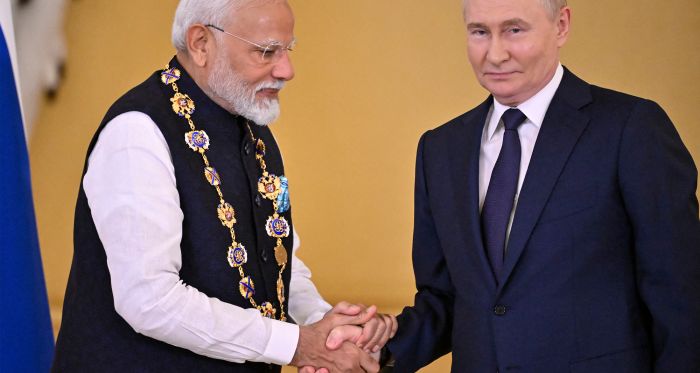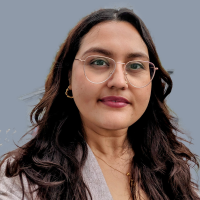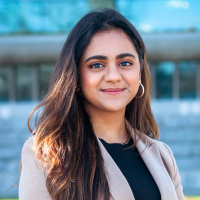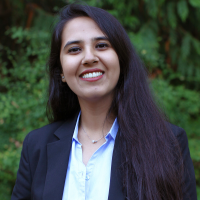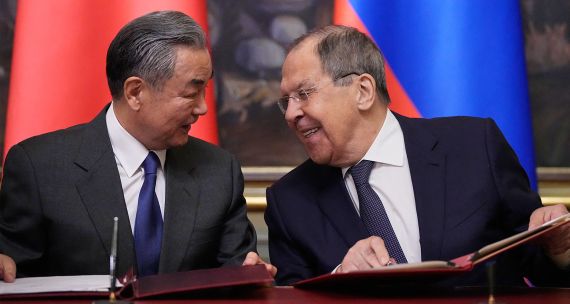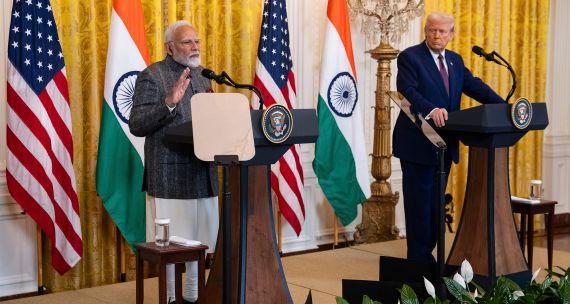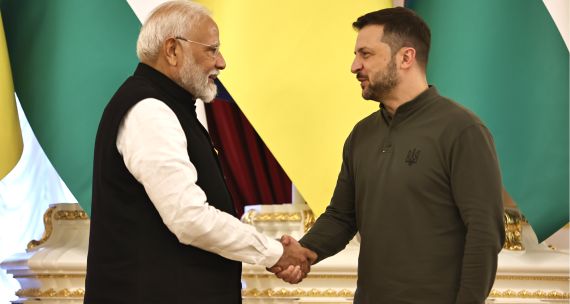The Takeaway
Indian Prime Minister Narendra Modi's visit to Russia from July 8–9 created a split-screen image encapsulating his difficult diplomatic balancing act: on one side was Modi, physically embracing Russian President Vladimir Putin and reiterating the two countries’ long-standing partnership, and on the other, in faraway Washington, D.C., the leaders of NATO countries — some of whom are seeking closer strategic relations with New Delhi — condemning Putin in the strongest possible terms.
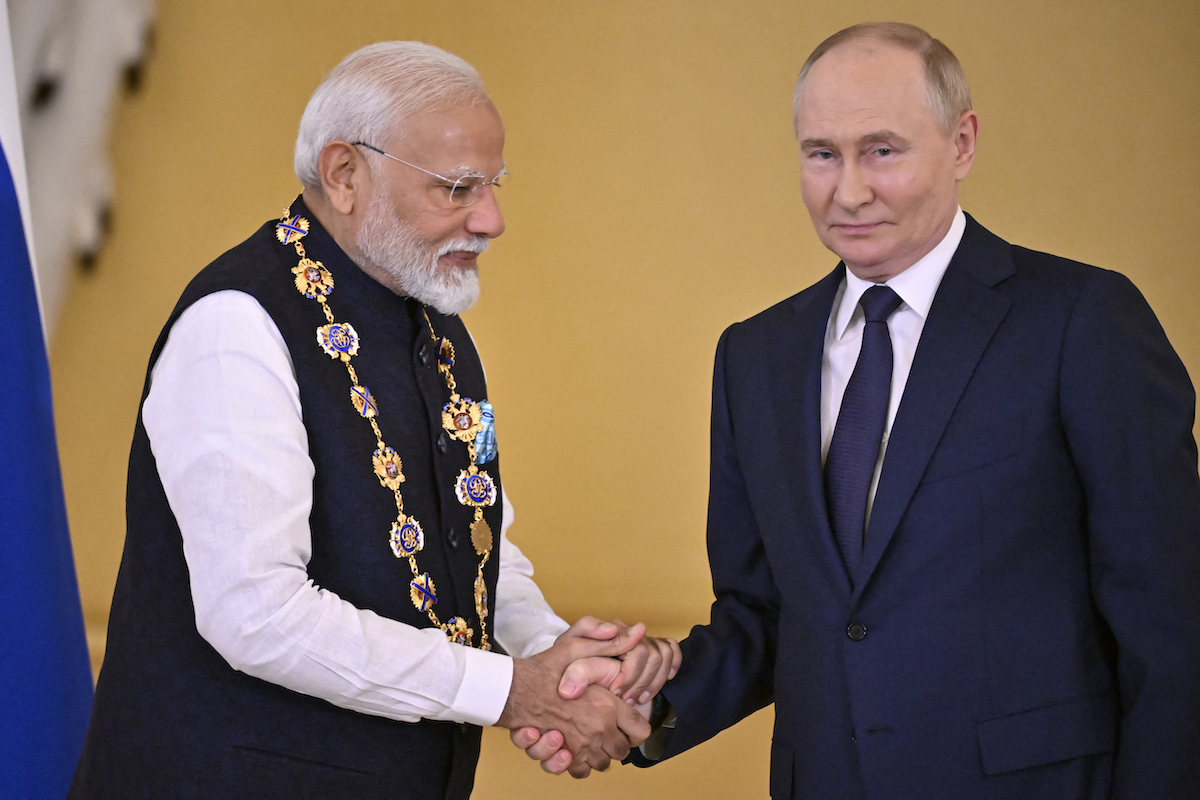
India’s courting of partners on both sides shows that its foreign policy remains grounded in “strategic autonomy”: maintaining maximum flexibility by avoiding formal alignment with either side.
In Brief
- Modi’s visit to Russia was his first bilateral foreign trip since the beginning of his third term as Indian prime minister in June. When the Modi-Putin meeting concluded, the two sides released a Joint Statement that provides a road map for future co-operation on defence, trade, connectivity, space, energy, and Russian assistance with the development of nuclear power plants in India.
- India derives substantial material benefits from the bilateral relationship. Forty-two per cent of the country’s crude oil imports come from Russia, and at discounted prices. This is a 20-times increase over the past couple of years.
- Diplomatically, however, the relationship has become more complicated. This was Modi’s first visit to Russia since Moscow’s full-scale invasion of Ukraine in February 2022. While India has not publicly condemned Russia’s actions, Modi signalled during his trip that “dialogue and diplomacy” were essential to end the war.
- Whereas many Western governments have tried to isolate Russia diplomatically and punish it economically through sanctions, Modi’s visit had the opposite effect, showcasing for Russian and international audiences that Putin maintains close ties with major world powers.
- For his part, Putin demonstrated the value he places on the relationship by awarding Modi the Order of Saint Andrew the Apostle, Russia’s highest civilian honour. Chinese President Xi Jinping received the same honour in 2017.
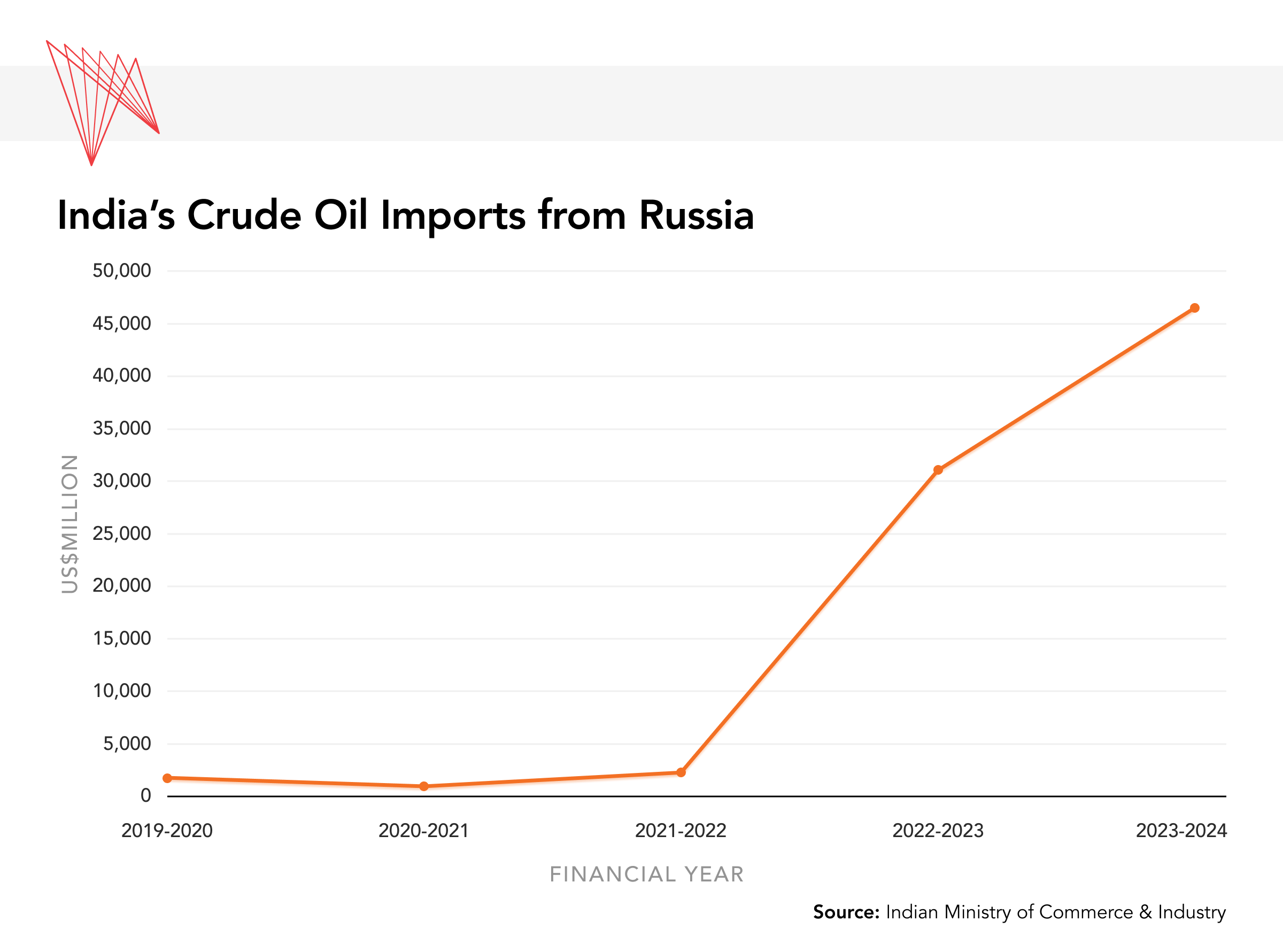
Implications
Looming heavily over the India-Russia relationship is the fact that their respective relationships with China have taken dramatically different turns. Moscow’s relationship with Beijing has deepened, driven by their shared strategic goal of countering the West. In contrast, Beijing has become New Delhi’s foremost regional adversary, especially since a violent clash erupted along their de facto border in 2020. The timing of Modi’s Russia visit may indicate that New Delhi is watching with concern the growing closeness between Russia and China.
India, increasingly wary of expanding Russia-China interdependence, may seek reassurances from the Kremlin, but it also strives to reduce its reliance on Russia. With roughly 60 per cent of its defence equipment of Russian origin, India also seeks to diversify its defence partnerships. ‘The China factor’ has therefore also pulled India closer to the U.S. and Western allies.
The optics of the Moscow meeting were likely regrettable for Modi, as his private dinner with Putin coincided with a Russian missile strike on a children’s hospital in Kyiv. While he was in Moscow, Modi said that "every person who believes in humanity" is "pained" when "innocent children are killed," and urged a peaceful end to the war, but Ukrainian President Volodymyr Zelenskyy was not reassured: on July 8, he referred to Modi’s Russia visit as “a devastating blow to peace efforts.” In June, Modi met Zelenskyy on the sidelines of the G7 summit, but that meeting did not prod India to add its name to the recent Ukraine peace summit statement because of Russia’s absence from the talks.
The U.S. State Department said it had raised concerns with India over its ties with Russia, but the White House held back from direct criticism, even casting the relationship in a potentially constructive light, suggesting that New Delhi’s relationship with Moscow could enable it to urge Putin to end the war.
What’s Next
- Continued defence co-operation
India and Russia are expected to sign a military logistics agreement, which will allow for the interoperability of their armed forces and give India access to Russian facilities in the Arctic. While Russia approved the draft of this pact in June, the agreement has not yet been signed. However, the countries have reaffirmed their commitment to joint defence manufacturing under India's ‘Make in India' initiative despite recent delays from Moscow in delivering S-400 missile system spare parts. On a separate military matter, Russia promised to repatriate Indian citizens who were apparently duped into serving in the Russian army. At least two Indians have been killed so far in the Russia-Ukraine war, and 35–50 Indian recruits are believed to be still serving in the Russian army, a situation the Indian external affairs minister, S. Jaishankar, has called “unacceptable.”
- India-Russia connectivity and economic ties
India’s imports from Russia reached about US$60 billion in the 2023-24 financial year, driven primarily by discounted oil purchases, while its exports to Russia were only US$4 billion. As India seeks to correct this trade deficit by increasing its exports, the two countries are moving 60 per cent of their bilateral trade payments to their national currencies. Russia, however, has accumulated an abundance of Indian rupees due to the trade imbalance.
To boost bilateral ties, Modi announced the opening of two new consulates in Russia. The two countries seek to develop a maritime route via the North Sea Route and expand the use of the International North-South Transport Corridor to bolster trade and connectivity. In addition, the Eastern Maritime Corridor between India’s Chennai Port and Russia’s Vladivostok are expected to connect India to the Russian Far East region.
Edited by: Vina Nadjibulla, Vice-President Research & Strategy; Erin Williams, Senior Program Manager, Asia Competencies; Ted Fraser, Senior Editor.
